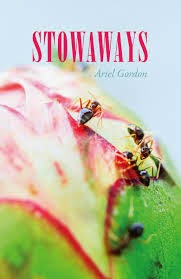I feel like this review requires more than one ‘full disclosure’ from me. I’ll confess that I’ve known Ariel Gordon since the 1996/97 academic year, when we were journalism students together at King’s in Halifax. I’ll also confess that I myself have entered into a relationship with her publisher, Palimpsest Press, which I’ll be making an announcement about in the coming weeks. What else? Should I mention that I spotted a number of Ariel’s poems when they were first published in literary journals, and admired them immensely? That they whetted the appetite to read a full collection of hers? Is that something one needs to disclose?
At any rate, I would still say that Stowaways is a delightful and energetic sophomore outing even without these tenuous connections to its author. The poems in this collection grapple with both the wild and the mundane, the animalistic nature of nature and relentless responsibilities of parenthood. Many of these pieces, especially in the first two parts, are in fact about collisions between the feral world and the domestic one. In poems like “Wingless Females”, “Little Pig,” and the collection’s title poem, Gordon (switching to the surname now; this is a review, after all) shows us how the natural world can insinuate itself into small, household moments. From the latter example:
I was glaring at the roof of the car
when I saw the wood tick
on your neck & when you lowered
the window & tossed it out, its legs skittered
against the dray ridges of skin
on your thumb
In each of the poems mentioned above, we see how the feral and domestic are not separate spheres that never touch; they are in fact informed and influenced by each other, in lots of small, startling ways. As if to remind us of the omnipresence of nature, Gordon peppers a number of her pieces with little asides of birdsong, from geese, grackles and other fowl.
There is also a great deal of playfulness to be found in Stowaways, especially in Part 3, which is a compilation of how-to poems. We get everything from “How to Make a Collage” and “How to Treat Leprosy” to my favourite, “How to Be Angry in Public”: “For use when women are on opposite sides of busy roads or being successfully restrained by spouses or members of one’s book club.” Here, Gordon is unafraid to stretch her funny bone for the pure zest of it.
I did have a few gripes, here and there. A few how-to poems bled into Part 4 of Stowaways, with no real explanation as to why they weren’t included in Part 3 with the others. There were some questionable punctuation decisions with a number of the pieces, especially in Part 1. And I also felt the collection would have ended much more strongly on “Apparent Magnitude: the Finlay 15P,” rather than making it the penultimate poem. This piece is a tiny tour de force about the astrologer William Henry Finlay, and its lines loop and swing and sparkle across our night sky like the very comet it describes. It also ends on the single-most devastating line in the collection, “(My father died alone)”, which would have been a much stronger note to finish on.
But small quibbles about a strong book. Gordon shows she’s got the chops to write in a number of modalities, and has a rich variety of subject matter in her brain to keep us guessing what she might write next.
Monday, September 22, 2014
Subscribe to:
Post Comments (Atom)


Thanks for this, Mark...
ReplyDelete